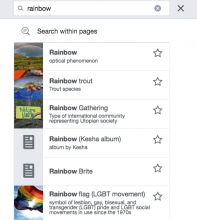Recently, @chelsyx asked:
Also, the dashboard shows there was a drop in the number of events at the end of March. Is there any change on the mobile web side that you know of may cause this drop?
The date of the sharp downtick is Wednesday, 29th March. On Thursday, 30th March there's a sharp uptick. Readers Web deployed the new mobile header treatment (including the search box) on that Wednesday. However, the uptick isn't as large as the downtick (circa 14 k events/day vs circa 20 k events/day).
IIRC there was an issue around migrating between the old and new versions of the header. This may explain the downtick on the day of the deploy and then the uptick the day after (at which point, the majority of the text cache had been invalidated).
Separately, @Nirzar noted that the number of Special:Search pageviews increased at around the same time. This uptick happened on Friday, 24th February.
Possible Investigations
- Per T176464#3636190, see if there was a change in the top N browsers visiting Special:Search around Friday, 24th February and Wednesday, 29th March.
Outcomes
Actionable by Software Engineers
- The timeline for deploying the new mobile header treatment ("the treatment") is well understood and documented.
- We test the hypothesis that implementing the treatment broke the instrumentation.
- See T176464#3657672.
- Any bugs in the treatment and/or MobileWebSearch instrumentation are created.
Actionable by Research/PO
- The reason for the increase of Special:Search pageviews is well understood and documented.


